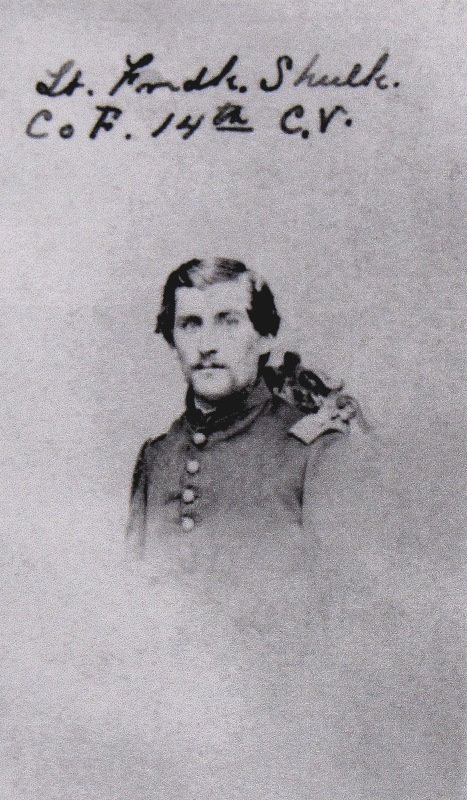|
First Lieutenant, FREDERICK E. SCHALK |
||
|
First Lieutenant, FREDERICK E. SCHALK, was born January 6th, 1838, at Monsheim, Hesse Darmstadt, Germany. The date of his removal with his parents to America, we do not learn, but only know that it was at an early age; that prior to his residence in Norwich, he lived for a time at Uncasville, in the same county, for some years before the war he lived in Norwich, as a clerk in a grocery store. At the outbreak of the war, he enlisted with young Nickels, of whom he was ever a close friend, in Capt. (now Gen.) Harland’s company of the 3d Connecticut. He served very creditably in the three months’ campaign, and then returned to his old employer in Norwich. Soon after his return he joined the Broadway Congregational church, in Norwich. He was one of the first to enlist in the 14th—May 27th, 1862—still accompanying Nickels, who came into the same company—E. Just before the regiment marched he was married to a lady in Lebanon, Conn. He was made a sergeant before the company left the State, promoted to be second lieutenant May 16, 1863, and to a first lieutenancy, November 5th. In all the battles, skirmishes, and marches of the regiment, he bore his part honorably and well, never flinching from any post of honor or danger. Of vigorous constitution and energetic yet cheerful disposition, he was ever ready for duty, for danger, or for fun and frolic. These qualities made him a great favorite, and somehow it seemed as if harm could never come to him. Yet in the terrific carnage of Spotsylvania, where the dear old 2d Corps, to which the 14th was attached, covered itself with glory by its brilliant charges, Schalk was stricken down by a bullet. He was removed to the 2d Corps hospital, at Fredericksburg, where, in plain view of the old battle-field of Dec. 13th, 1862, he ebbed away his life-blood and died, May 21st, 1864; dying cheerfully and calmly, despite the absence of the dear ones at home for whom he longed. Perhaps, as he heard the little birds singing in the beautiful May morning, and looked out upon that bloody battle-field of six months before, where the rapidly springing up green grass showed that Nature speedily repaired man’s devastations, the roll of the guns of the contending armies a few miles away ceased to echo in his ears, and with the recollection of those divine words, “Not even a sparrow falleth to the ground without his knowledge,” fears for the future of his dear wife passed away, and his spirit fled to the land “where the wicked cease from troubling, and the weary are at rest.” The remains were taken home and the funeral held from the Baptist church in Lebanon, on Sunday, June 5th. There was a very large attendance from the town, the surrounding country, and from Norwich, including some of the officers of his regiment. The funeral sermon was delivered by Rev. Mr. Cunningham, from Genesis v. 24, and was pertinent and applicable. The remains having been embalmed, his friends were enabled to gaze upon the face of the young hero ere his coffin was closed. His sword rested upon the coffin, surmounted by wreaths of flowers. The body was escorted to the grave by the Norwich Light Infantry, his fellow-officers acting as bearers. The farewell volleys having been fired over the grave of him who had given his life so cheerfully for the cause of freedom in an adopted country, we left him “With his young fame about him for a shroud.” |
||
